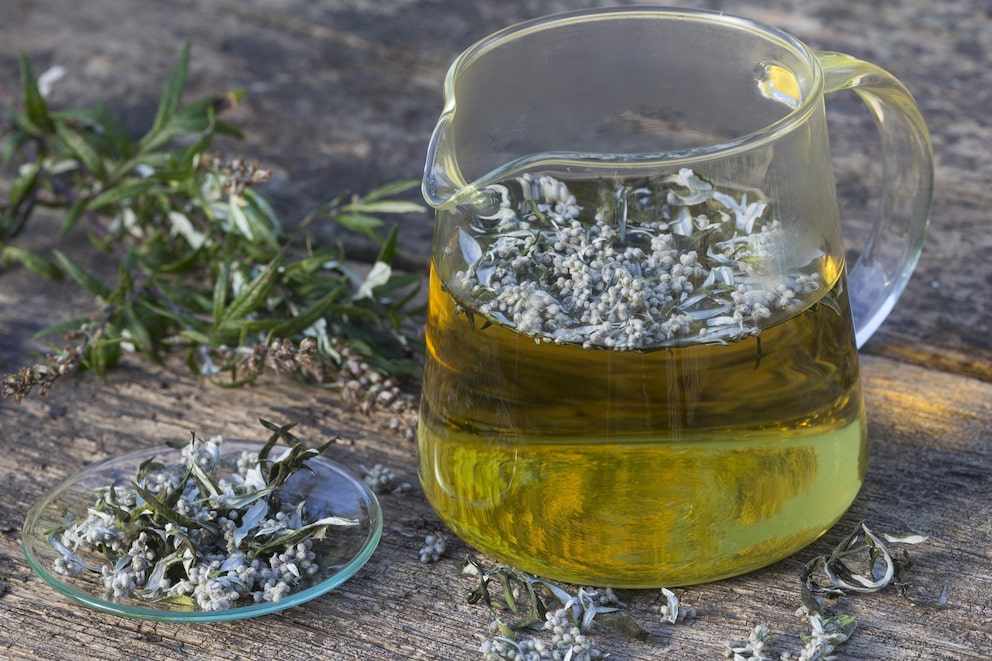Mugwort tea has been used for centuries as a remedy for various ailments such as digestive problems. FITBOOK reveals how the power of the plant affects the human body.
In the garden and on lawns, mugwort or “Artemisia vulgaris” is classified as a weed and likes to be thoroughly removed. What gardeners find disturbing in the home garden has a healing effect on health when prepared as mugwort tea. Even in ancient times, the plant was used primarily to treat aching feet and tiredness.
—
What ailments should the tea help with?
In medicinal and alternative medicine, mugwort tea is recommended for women and digestive problems because of its antispasmodic effect. It is said to relieve menstrual pain and heartburn, promote menstruation and contractions, and stimulate digestion and appetite. In addition, mugwort and mugwort tea have an antibacterial effect and are therefore an effective remedy against certain infections, such as yeast fungi. In addition, the tea is said to have an anti-cancer effect and a beneficial effect on heart health.
Also interesting: Lapacho tea – what effect does the Inca drink have on health?
What active ingredients are in the tea?
Mugwort tea contains a variety of health-promoting ingredients. The essential oils it contains, such as camphor and thujone, have an antibacterial and antiviral effect. The high proportion of flavonoids strengthens the body’s defense system. And the tannins present stimulate digestion and support the work of the gastrointestinal tract. The tea also contains phenolic acids, a substance that has an antioxidant effect, and the anti-inflammatory coumarin.1,2
Is the effect of mugwort tea scientifically proven?
As of today, the effect of mugwort tea has not been scientifically proven. Some studies indicate a possible health-promoting effect of the plant, but further studies are needed to be able to speak with certainty of a health benefit. A few animal studies have come to the conclusion that the consumption of mugwort lowers cholesterol and inflammation levels in the blood. Another in vitro study, i.e. tests in a test tube, found that mugwort oil was effective against a fungal infection with the yeast “Cadida albicans”.3,4,5
Also interesting: The little-known anti-aging effect of blackberry leaf tea
Are there possible risks and side effects?
Since mugwort herb has a menstrual and labor-promoting effect, pregnant and breastfeeding women should refrain from consuming the tea. Mugwort tea can also potentially cause an allergic reaction in people who have a pollen allergy or an allergy to ragweed or another plant in the same plant family. Accordingly, you should approach the tea with caution. At the first sign of an allergic reaction, you should stop eating immediately and – in the case of a severe reaction – consult a doctor.
—
Where is the tea available and how is it prepared?
Mugwort tea can be found in every well-stocked pharmacy and in various online shops. If you want to prepare the drink yourself, you have to harvest the 40 to 60 centimeter long branches of the plant at the beginning of the flowering period in June and July, when the flowers are still closed. The older the flowers and leaves of the plant, the more bitter they are. After harvesting, mugwort can either be used immediately or, if you want to keep it longer, you can first hang the branches up to dry in a warm, airy place and then chop them into a herb.
For a 200 milliliter cup of mugwort tea, you have to pour boiling water over a teaspoon of mugwort in order to benefit from the full effect of the medicinal plant. The tea must then be covered for 5 to 7 minutes and then strained. In order not to lose the bitter substances, the tea should not be sweetened.
Also interesting: Peppermint tea has a pain-relieving and antispasmodic effect
How does mugwort tea taste?
Some may recognize the pungent and bitter taste of mugwort from cooking as a spice or component of certain savory dishes. The taste of the plant is reminiscent of mint or juniper. Since the drink is usually not sweetened because of the bitter substances in tea, it tastes very tart and not everyone likes it. If you still want to be convinced of the alleged effect, you may have to do without the enjoyment aspect when consuming mugwort tea.
Sources
- 1. Ekiert, H., Pajor, J., Klin, P. et al. (2020). Significance of Artemisia Vulgaris L. (Common Mugwort) in the History of Medicine and Its Possible Contemporary Applications Substantiated by Phytochemical and Pharmacological Studies. Molecules.
- 2. Litscher, D. (2016). Artemisinin. Acupuncture & Auricular Medicine.
- 3. El-Tantawy, WH (2015). Biochemical effects, hypolipidemic and anti-inflammatory activities of Artemisia vulgaris extract in hypercholesterolemic rats. Journal of Clinical Biochemistry and Nutrition.
- 4. Kayyamkani, AK (2015). A preclinical antihyperlipidemic evaluation of Artemisia vulgaris root in diet induced hyperlipidemic animal model. International Journal of Pharmacological Research.
- 5. Obistioiu, D., Cristina, RT, Schmerold, I. et al. (2014). Chemical characterization by GC-MS and in vitro activity against Candida albicans of volatile fractions prepared from Artemisia dracunculus, Artemisia abrotanum, Artemisia absinthium and Artemisia vulgaris. Chemistry Central Journal.
–

